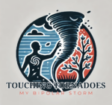When Mania Hijacked My Dream: A Journey Through My First Bipolar Episode
For 15 years, I’d been chasing a podcast dream. My friends, my second cousin, and I had been creating comedy shows, pouring our hearts into something we believed was special. We might not have found mainstream success, but we had passion. Then came the Okay Taco Company – our attempt to merge our podcast with a business venture.
March and April of 2023 changed everything.
It started on Groundhog Day, when we opened our Route 66 taco shop. That second night, something fundamental shifted inside me. I describe it like being hit by lightning – a moment where my brain’s circuit breakers blew, and I felt like I’d died and been reborn.
The mania crept in slowly, then consumed me entirely.
I started exercising obsessively. Not just regular workouts, but extreme, punishing routines. Running stadium stairs with my eyes closed. Sprinting miles on railroad tracks. Pushing my body to impossible limits, feeling like I was battling some internal demon.
My mind became a kaleidoscope of delusions. I believed I was a reincarnated Native American warrior with a cosmic mission. Every coincidence felt significant. The triangular shape of our property, the town’s devil mascot, even the songs on my AirPods – everything seemed like a message from the universe.
One morning, dressed in a Spider-Man hoodie, I ran to my children’s school. I kicked a ball over the fence, danced on the school’s devil mascot statue, and felt like I was fighting unseen spiritual battles. When police stopped me, I was convinced I was facing a life-or-death spiritual test.
Our taco shop dream ended. But my podcast dream? That survived.
I was diagnosed with bipolar 1 in April 2024, understanding retroactively what had happened to me. Now, I’m sharing my story – still creating, still connecting, still chasing that podcast dream that has always been my true passion.
This podcast is my way of turning a challenging experience into something meaningful. A way to connect, to understand, and hopefully help others who might be going through similar struggles.
My journey isn’t about the destination. It’s about keeping the dream alive, no matter what obstacles appear.
